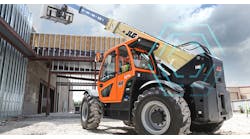It doesn’t take a genius to figure out that the oil and gas business is great for the local economy of a region (read the cover story on page 20 to get an idea of what it has meant for Cleveland Brothers), but it takes a well-managed company to benefit. Increased demand for equipment is obviously what every rental company wants, and Cleveland Brothers faced enough demand that it spent $300 million over the past few years to expand its fleet. Not every rental company would be capable of doing that, no matter how much demand there might be, and not every company would be able to intelligently manage the logistical challenges of it. And obviously this most recent recession gave us more than a few cautionary tales of what can happen when a company expands too fast, builds up too much fleet and debt and sees the bottom drop out of a market. We saw it happen in the real estate world and we certainly saw it happen in the equipment rental industry.
In the case of the oil-and-gas business, a rental company obviously needs to study that market and in the case of a particular shale play, needs to understand how long demand is likely to last and have a good plan for what to do as that demand ends. It also bears understanding that it’s not just a fun uphill climb, that there are ebbs and flows and peaks and valleys to it and the rental company needs to understand the cycles.
One of the things that most impressed me about Cleveland Brothers is its segmented sales approach. The vast majority of rental companies that have outside sales staffs use territory-based systems. Salesman Steve, you’re going to concentrate on this particular county, from west of Interstate 17 to the county line and everything south of the airport. All the customers, potential customers and jobsites that fall in that area are yours and if a company or job moves, we’ll figure it out from there and if a contact that you have a great relationship with changes gigs, we’ll figure that out as well.
There’s nothing wrong with this system, it has worked in this industry for years. But the staff of Cleveland Brothers realized quickly that the demands of the oil-and-gas industry were far different from those in the construction market and it would make more sense to have staff concentrate on understanding it and catering to its unique needs. The processes are different, the dynamics are different and obviously the quantities are significantly different as learned when calls come in for 50 excavators and 20 dozers to be delivered next Tuesday.
Cleveland Brothers understood that it needed to profoundly understand the demands and the cycles and the likely durations of time in the oil-and-gas marketplace. They need to have visibility regarding if an order comes in for the type of quantity I just described, what is going to happen and how to prepare for the fact that those 70 pieces of equipment might suddenly be ready to come off rent with one week’s notice as well, because what goes on rent eventually has to come off.
Also that sales rep best be ready to travel. One customer or jobsite might be 30 miles west and another 100 miles east, and one corporate office might be local and another might be in Houston and another in Slidell, La. So it’s not just 30 miles north on Route 12 and 40 miles east on Route 20.
Cleveland Brothers already was operating with that type of customer segmentation. It has staff that calls on railroads, others that call on plumbers, and another that calls on industrial accounts and those salespeople know a lot about those industries.







